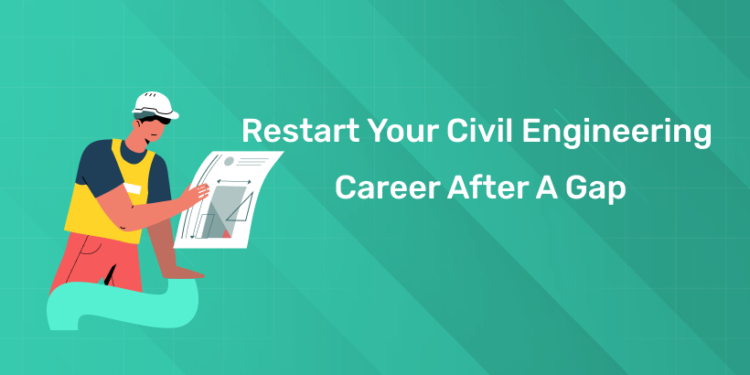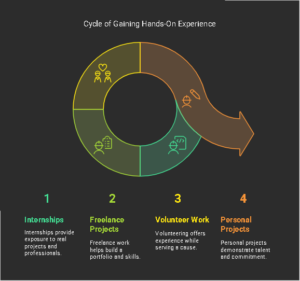Table of Contents
Introduction
Are you in a civil engineering dead end and looking for a new direction? If it was personal, family, or just needing time off, that’s why the gap, it can be intimidating to go back into the workforce. But here’s the positive side: Civil engineering is a dynamic area, and there will be opportunities for those who can embrace change. You have the opportunity to revive your career as a civil engineer, and a strategy, frame of mind, and effort can help you do it.
Follow this blog post for the steps you need to take to revive your career in civil engineering. We’ll guide you through every step to make a successful comeback, from evaluating what you know and what you need to learn to hands-on practice and interview tips. So, let’s jump right in!
Assess Your Current Skills and Knowledge
1: What is the main purpose of a Bill of Quantities (BoQ)?
You’re ready to embark on a civil engineering career again. First, assess what you have. Civil engineering is a broad field, including structural engineering, transportation, geotechnical, environmental, and other specialties. Tools and technology are constantly evolving, and you need to assess where your knowledge or skills may be lacking.
Start by asking yourself these questions:
- What were your key strengths prior to the gap?
- Have there been changes in technology or industry standards since you last worked?
- What new software or methods are now must-haves?
Or, if you’re really good at AutoCAD but haven’t used it in a while, you might want to get up to speed on that. And if BIM has become standard in your field, you need to bone up on it. Do an honest appraisal of yourself and write down the capabilities you need to refurbish or master.
Get hands-on with our Quantity Surveyor course – sign up for a free demo!
Master Quantity Surveying – Build a Rewarding Career Today!
Gain in-demand skills in cost estimation, project budgeting, and contract management with our Quantity Surveying Course. Learn from industry experts and boost your career in construction and infrastructure. Enroll now and take the first step toward success!
Know MoreSuggest Upskilling: QS Course and Beyond
Now that you’re aware of what you don’t know, it’s time to upskill. The best way to do that is to take classes that will teach you what’s in demand now. A Quantity Surveying (QS) course would be a boon for civil engineers wanting to improve their skills in cost estimating, project managing, and contract administering. Quantity surveying is a key construction skill, and there is a strong demand for it.
But there’s more. Maybe look into other civil engineering niches that are needed, like sustainable design, green building, or structural analysis. There are many online courses geared to civil engineers offered by Coursera, Udemy, LinkedIn Learning, and others. There are also various professional credentials and training offered by organizations, such as the American Society of Civil Engineers (ASCE), which can enhance your resume.
Not only will upskilling give you new tools, it will also signal to employers that you are serious about remaining relevant. It’s a great investment in yourself.
Suggest Ways to Gain Hands-On Experience
Training is important, but there’s no substitute for real-world experience. If you haven’t worked in a while, you might feel rusty or lacking in practical skills. The good news is there are many ways to get experience and restore your confidence:
Internships: Numerous companies provide internships for workers attempting to re-enter the job market. They give you a chance to actually work on projects, benefit from the presence of real engineers, and see what’s being done now. Don’t let the word ” internship ” scare you—it’s a door opener.
Freelance Projects: Websites such as Upwork, Freelancer, and Fiverr match freelancers with those who need civil engineering work done. Freelance jobs can give you the edge; there’s no reason you can’t do them to build a portfolio and hone your skills and even make some money as you move back to full-time.
Volunteer: Many charitable and community organizations could use your civil engineering skills. You can help out with such projects, and in addition to serving a cause you care about, you’ll get experience and meet people.
Personal Projects: If you can’t find internships or freelance jobs, do personal projects. Or you might sketch out a tiny building, put together a budget for a made-up project, or even launch a blog discussing your thoughts on civil engineering trends. These can be real demonstrations of your talent and commitment.
Prepare for Interviews
After you’ve brushed up your skills and done some practice, it’s time to get ready for interviews. It’s an opportunity to display your skills, passion, and eagerness to get back to work. To interview effectively, try these:
Update Your Resume:
Customize your resume to emphasize the best matching skills and experiences. Address the gap honestly, but emphasize what you have been doing to stay active in the field—courses, projects, volunteer work.
Practice Common Interview Questions:
Expect to field questions about any gaps in your career, why you want to come back now, and how you’ve stayed current. Rehearse your answers, and say them confidently and positively.
Showcase Your Adaptability:
Employers want workers who can handle change. Emphasize any new technologies, approaches, or developments that you’ve adopted while you were out.
Ask Insightful Questions:
Interviews work both ways. When you inquire about the company’s projects, culture, or expectations, it shows that you are truly engaged and interested in the position.
Leverage Your Network:
Contact people you used to work with, or mentors, or simply people you know in the industry who might be able to give you leads or referrals. Networking can sometimes circumvent locked doors.
Master Quantity Surveying – Build a Rewarding Career Today!
Gain in-demand skills in cost estimation, project budgeting, and contract management with our Quantity Surveying Course. Learn from industry experts and boost your career in construction and infrastructure. Enroll now and take the first step toward success!
Know MoreStay Persistent and Positive
And it’s okay if it doesn’t happen overnight as you restart your civil engineering career. Just keep trying and stay positive. Rejection is part of looking for a job; each rejection is a step closer to the right job.
Here are some ways to stay motivated:
- Make goals attainable, and enjoy incremental victories.
- Get involved in professional associations or forums online where you can meet other civil engineers and trade stories.
- Try to learn and hone your skills a little each day.
- Think about why you became interested in civil engineering and what you can accomplish.
- Don’t let the career gap define you. The most important thing is what you do next.
Start a rewarding career in Quantity Surveying! Book for Free Demo Classes Here!
Conclusion
You really can restart your civil engineering career after a break. You can become a credible applicant by evaluating your strengths, taking courses such as a QS to upskill, finding relevant experience, and preparing well for interviews. Above all, be persistent and positive; you will succeed if you stick with it.
There are really a lot of opportunities in civil engineering if you’re open to evolving. If you’re involved in building sustainable infrastructure, overseeing construction, or creating cutting-edge software, we need you. So go ahead and take that first step today to revive your civil engineering career. You can create the future!
Master Quantity Surveying – Build a Rewarding Career Today!
Gain in-demand skills in cost estimation, project budgeting, and contract management with our Quantity Surveying Course. Learn from industry experts and boost your career in construction and infrastructure. Enroll now and take the first step toward success!
Know MoreFrequently Asked Questions
How do I explain my career gap to potential employers?
Explaining a career gap can feel intimidating, but honesty and confidence are key. Start by briefly stating the reason for your gap (e.g., personal reasons, family commitments, health issues, or further education) without going into unnecessary detail. Then, immediately pivot to what you did during that time to stay connected to the field. For example, mention any courses you took, certifications you earned, freelance projects you worked on, or volunteer work you completed. Emphasize how these activities kept your skills sharp and prepared you for a successful return to the workforce.
What are the most in-demand skills in civil engineering right now?
The civil engineering industry is constantly evolving, and certain skills are highly sought after. These include:
- Proficiency in Building Information Modeling (BIM) software like Revit or AutoCAD Civil 3D.
- Knowledge of sustainable design and green building practices.
- Expertise in project management and cost estimation (e.g., Quantity Surveying).
- Familiarity with geotechnical engineering and advanced structural analysis tools.
- Strong communication and collaboration skills, especially for interdisciplinary projects.
Staying updated with these skills can make you a competitive candidate in today’s job market.
Is it worth taking a Quantity Surveying (QS) course to restart my career?
Absolutely! A Quantity Surveying (QS) course is an excellent way to upskill and enhance your career prospects. Quantity surveyors play a critical role in construction projects by managing costs, contracts, and budgets. This skill set is highly valued in the industry and can open doors to roles in project management, cost estimation, and consulting. Additionally, a QS course demonstrates to employers that you’re committed to staying relevant and expanding your expertise.
How can I gain hands-on experience after a long career gap?
Gaining hands-on experience is crucial for rebuilding your confidence and skills. Here are some practical ways to do so:
- Internships: Look for internships designed for professionals returning to the workforce.
- Freelance Projects: Take on small projects through platforms like Upwork or Freelancer.
- Volunteering: Offer your skills to non-profits or community projects.
- Personal Projects: Design hypothetical structures, create cost estimates, or explore new software tools.
These experiences not only refresh your skills but also provide tangible examples to showcase during interviews.
How do I update my resume after a career gap?
Updating your resume after a career gap requires a strategic approach. Here’s how to do it:
- Highlight Relevant Skills: Focus on the skills and experiences that are most relevant to the job you’re applying for.
- Address the Gap Briefly: Include a short explanation of your career gap in your cover letter or resume, emphasizing what you did during that time to stay engaged with the field.
- Showcase Achievements: Use quantifiable achievements to demonstrate your impact in previous roles (e.g., “Reduced project costs by 15% through efficient resource management”).
- Include Recent Activities: Add any courses, certifications, or projects you completed during your gap.
What certifications should I consider to boost my civil engineering career?
Certifications can significantly enhance your resume and demonstrate your commitment to professional development. Some valuable certifications for civil engineers include:
- PE License (Professional Engineer): Essential for higher-level roles and consulting.
- PMP (Project Management Professional): Ideal for those interested in project management.
- LEED Accreditation: Focuses on sustainable design and green building practices.
- BIM Certification: Validates your expertise in Building Information Modeling.
- QS Certification: Enhances your skills in cost estimation and contract management.
Research which certifications align with your career goals and invest in those that offer the most value.
How can I network effectively after a career gap?
Networking is a powerful tool for restarting your career. Here are some tips to network effectively:
- Reconnect with Former Colleagues: Reach out to old coworkers, mentors, or classmates to let them know you’re returning to the workforce.
- Join Professional Organizations: Organizations like ASCE (American Society of Civil Engineers) offer networking events, webinars, and resources.
- Attend Industry Conferences: Participate in conferences, workshops, or seminars to meet professionals in your field.
- Leverage LinkedIn: Update your LinkedIn profile, join relevant groups, and engage with posts to expand your network.
- Informational Interviews: Request informal meetings with industry professionals to learn about their experiences and seek advice.
What should I do if I feel out of touch with the latest industry trends?
Feeling out of touch is natural after a career gap, but there are several ways to catch up:
- Read Industry Publications: Subscribe to journals, magazines, and blogs like Civil Engineering Magazine or Engineering News-Record (ENR).
- Follow Thought Leaders: Stay updated by following industry experts on LinkedIn or Twitter.
- Take Online Courses: Platforms like Coursera, Udemy, and LinkedIn Learning offer courses on the latest trends and technologies.
- Attend Webinars and Workshops: Many organizations host free or low-cost events to educate professionals about emerging trends.
- Join Online Forums: Participate in discussions on platforms like Reddit or specialized civil engineering forums.
How can I stay motivated during my job search?
The job search process can be challenging, but staying motivated is crucial. Here’s how to keep your spirits high:
- Set Small Goals: Break your job search into manageable tasks, such as updating your resume, applying to a certain number of jobs per week, or networking with a specific number of people.
- Celebrate Progress: Acknowledge and celebrate small wins, like landing an interview or completing a certification.
- Stay Connected: Engage with the civil engineering community through forums, social media, or local meetups.
- Focus on the Big Picture: Remind yourself of your long-term goals and the impact you want to make in the field.
What are the best strategies for acing a civil engineering interview after a gap?
Acing an interview after a career gap requires preparation and confidence. Here are some strategies:
- Research the Company: Understand their projects, values, and recent achievements to tailor your responses.
- Practice Common Questions: Be ready to explain your career gap, your reasons for returning, and how you’ve stayed updated.
- Showcase Your Skills: Use specific examples to demonstrate your expertise and problem-solving abilities.
- Highlight Adaptability: Emphasize how you’ve embraced new technologies or methodologies during your gap.
- Ask Insightful Questions: Show your interest in the role by asking about the company’s future projects, team dynamics, or challenges they’re facing.
- Be Positive and Confident: Approach the interview with a positive attitude and confidence in your abilities.
























